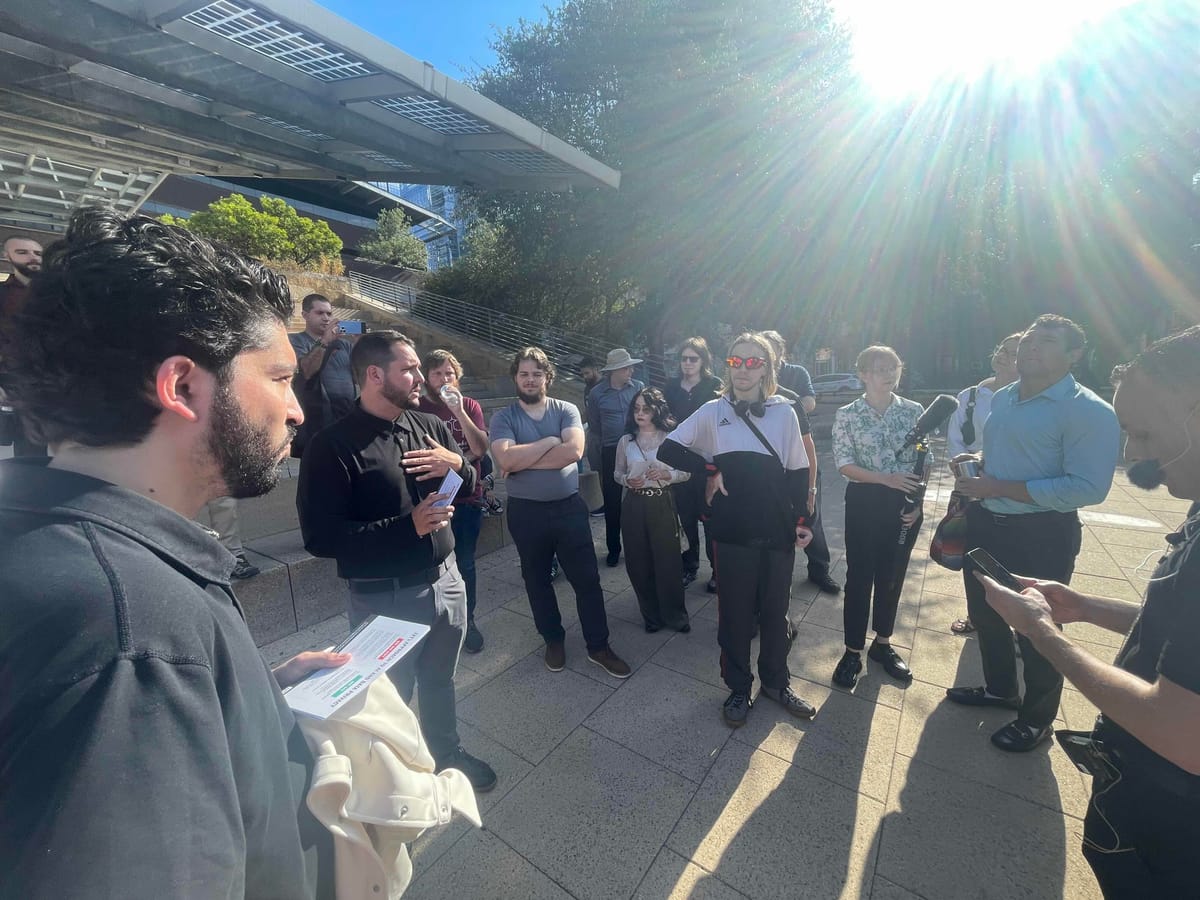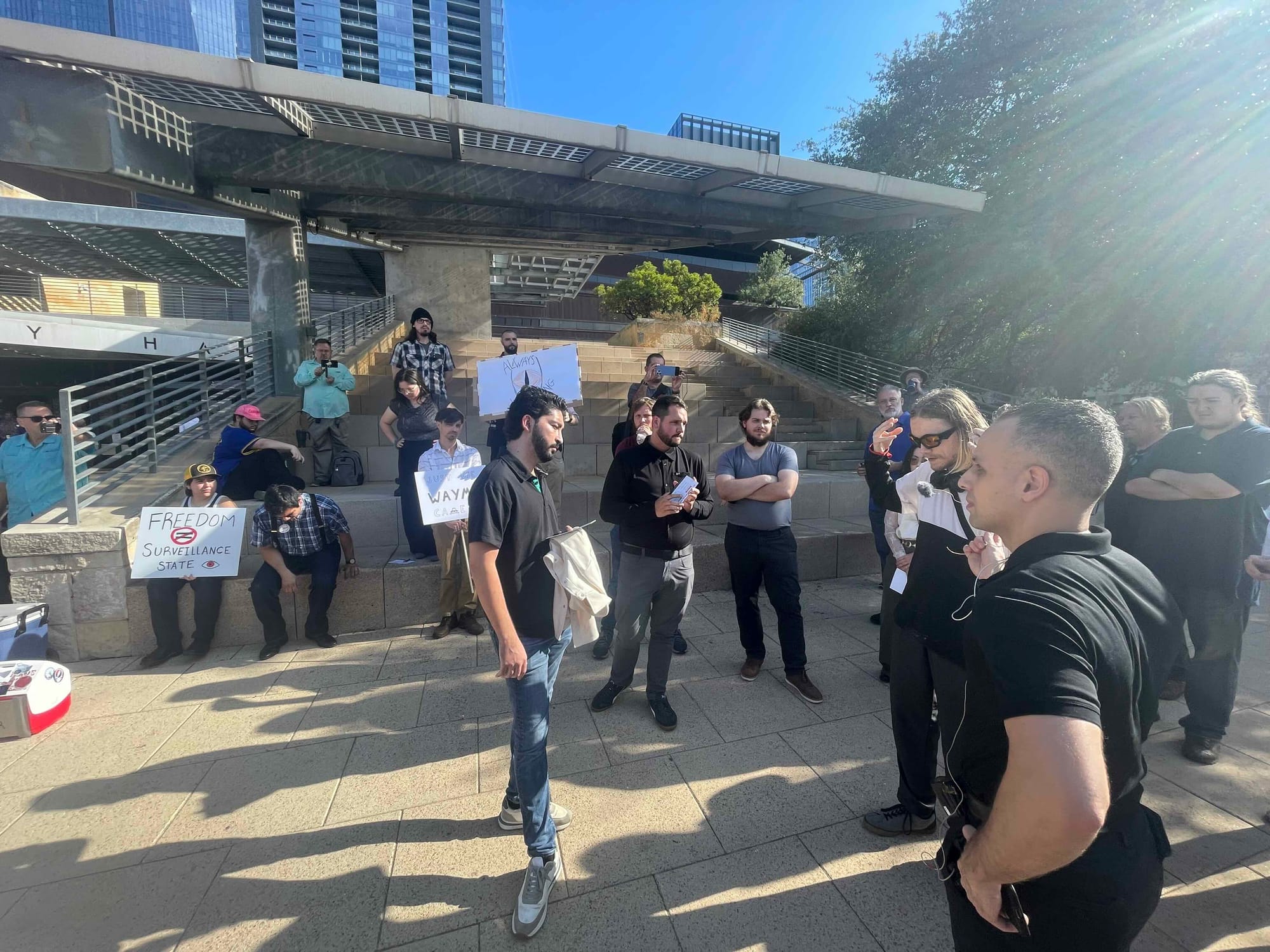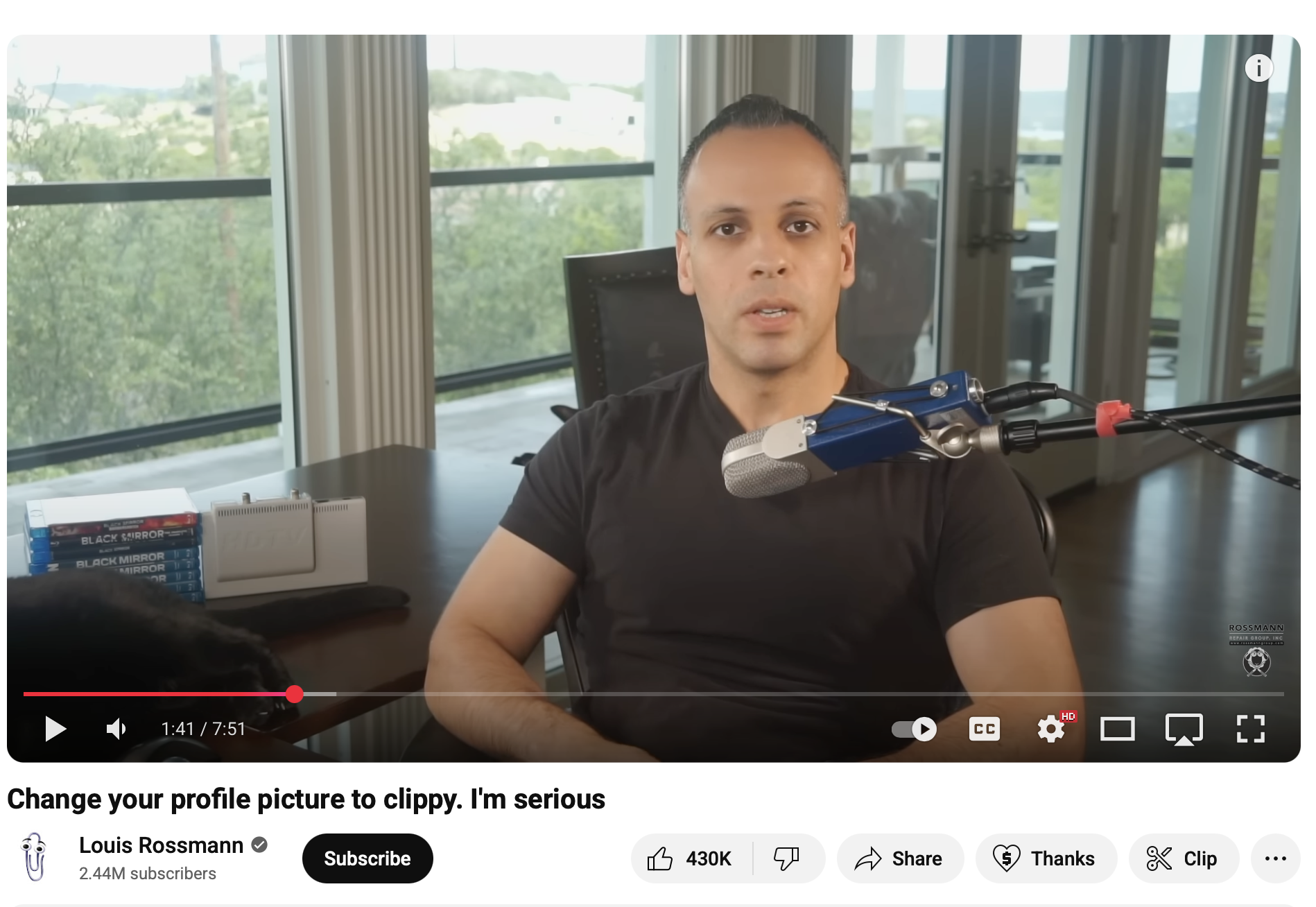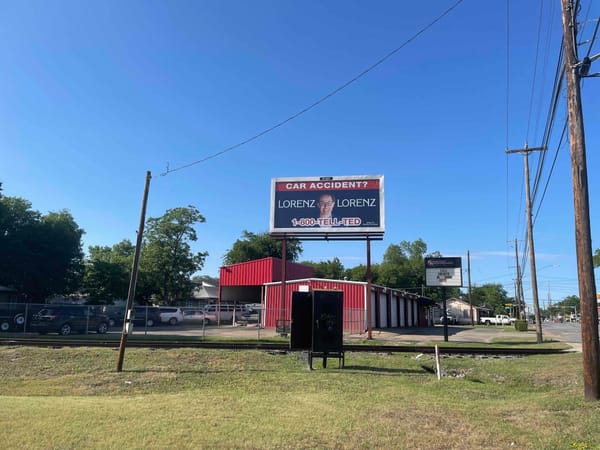The clippys come to City Hall
A big YouTube personality gets his fans involved.

City Council staff is going to have to add a new tile to their "constituent bingo" cards: Anti-surveillance activists signing up to speak on things that have nothing to do with surveillance.
Who are all these people?
Usually two or three dozen people show up for a cause at City Hall, I recognize at least a few faces. But I didn't recognize any of those gathered in a crowd on the City Hall front steps Thursday, interrogating two representatives for LiveView Technologies, the company the city has proposed paying $400,000 a year to install and operate AI-powered security cameras in parks.

As every one of them made clear to me, they had varying politics, interests, ages and occupations, but all of them were fans of Louis Rossmann, the owner of a local electronics repair and data recovery service who commands a significant audience on YouTube, where he regularly highlights ways that tech companies are ripping you off, stealing your data and generally screwing you over.
Rossmann has been banging the drum against the city's proposed contract with LVT since it first appeared on the Council agenda in August. On his website he warns that LVT's AI-powered cameras will "track you with thermal imaging from 1,200 feet away" and "blast loud music to harass bystanders until they leave."

LVT's speakers are indeed a big part of their value proposition, but their advertised use is to alert potential neer-do-wells to their presence with the hope of deterring crime. The company says the speakers are capable of playing music, but it does not describe it as part of the standard operating procedure.
LVT spokesman Matthew Deighton submitted to an interview on Rossmann's show and insisted the cameras don’t use facial recognition, but in his remarks on Thursday, Rossmann highlighted text on the company's own website that listed facial recognition as one of the uses "enabled" by LVT's video analytics software.
“How fucking stupid do you think I am?” he asked. “How fucking stupid do you think the viewers of this channel are?"
The website now says, "Though facial recognition is a form of video analytics, LVT does not use facial recognition."
After Rossmann urged his fans to attend the Aug. 28 Council meeting to oppose the camera contract, city staff withdrew the item from the agenda and postponed it until the Sept. 25 meeting. But then shortly before last week's meeting, the agenda item was again withdrawn.
Rossmann felt the city had twice pulled the rug on those who had made plans to attend the meeting to voice their concerns. Rossmann was additionally offended by the city's distinct process for signing up to comment on an item that isn’t on the agenda. The only time you can do that is at noon, during "General Citizen Communication," which is capped at 10 speakers.
On Thursday representatives from LVT managed to snag two of those 10 noon speaker slots.
"So the company gets to get heard," said Rossmann in a Monday video that has been viewed 180,000 times. "But you don't."
Rossmann encouraged his fans to show up anyway. In addition to holding signs in front of City Hall and debating the LVT reps, many of them signed up to speak on unrelated agenda items. They found ways to register their objection before being ruled out of order by Mayor Kirk Watson.
"I am here to talk about Item 1," said one man, referring to a contract for the city to provide animal services to unincorporated parts of Travis County. "What I am NOT here to talk about is a $2 million surveillance state initiative."
Another woman signed up to speak on a mundane water utility contract, saying she was "happy to see funding" for infrastructure that "supports people's freedoms," in contrast to surveillance cameras.
"We appreciate you being here but you're out of order," Watson said repeatedly. In all but one case the speakers did not contest the mayor and ended their remarks.
The cameras
It's not clear if or when City Council will actually vote on the security cameras. In remarks on Thursday, Deighton, the LVT spokesman, insisted the company would not share data with third parties and that all of the video footage is deleted after 45 days. It is up to the customer – in this case the city – how it uses the video collected, said Deighton. The company will only share footage with law enforcement in response to a subpoena, he said.
In a brief conversation outside of City Hall, Rossmann disputed the idea that the cameras would reduce crime. Instead they would simply push crime from one area to another, prompting the city to keep putting up more cameras until the whole city is under surveillance. More parks maintenance and a couple of parks rangers would be more cost-effective at deterring crime from parks, he said.
In fact, the proposed tax rate election includes a $6 million boost to parks maintenance and that still probably won't be nearly enough.
Rossmann is likely right that cameras may simply move crime elsewhere, but that may very well be the point. If you're going to deal fentanyl, I'd greatly prefer you do it under the highway overpass than at the playground. There is little that erodes confidence in community and government more than seeing a prized public asset get run over by crime.
However, the flagrantly fascist direction of Trump II is making it very hard for liberal elected officials to support any kind of surveillance. Fear of enabling persecution of immigrants, dissidents or women seeking abortions similarly doomed APD's license plate reader program.
The Clippies
Many of Rossmann's fans now identify as “clippies," inspired by a video Rossmann posted a month ago that has since racked up 4.6 million views. The name is a reference to “Clippy,” the friendly paper clip who helped you navigate late 90's Microsoft Word.

Clippy is an example of a technology that was fundamentally good – or at least harmless. The relationship was straightforward. You had purchased a product and Clippy was helping you use it.
“There were no ulterior motives,” said Rossmann in a recent video. “If you told Clippy you were having a bad day, he wasn’t going to use that information to try to figure out which advertiser to sell you to.”
Rossmann’s following draws from across the political spectrum, from socialists to libertarians. What they share is outrage over the power and abuses of the "tech oligopoly," who they accuse of turning the internet into a hellscape of surveillance and exploitation. Many are technologists who are disgusted by how a place that was supposed to be free and open has been captured by a handful of massive digital landlords to whom we are all unwittingly paying rent with our attention and data.
Mackenzie Rhine, a law student who works at the Wikimedia Foundation, the nonprofit that supports Wikipedia, told me that while Rossmann may have inspired the movement, he does not command undying loyalty from self-described clippys.
"I have never seen a group of people roast their leader (so much)," she said. "If you look at the comments on the livestream it will be like, 'Louis is an actual idiot, he needs to fix the audio.'"
Rossmann's own business reflects an ethos of independence and transparency. He sees his role as helping customers retain agency over their technology – to use it and repair it as they wish. On the FAQ page, for instance, he proudly states he is "absolutely not" one of Apple's "certified" repair shops: "Being Apple authorized would tie my hands to the point where I have to charge you $750-$1250 to replace your motherboard because of that one component!"
In sharp contrast to the Silicon Valley billionaires who describe their companies and products in grandiose, galaxy-redefining terms, there is something strikingly prosaic about Rossmann's tech world. He told me he moved to Austin from New York City three and a half years ago and started his current business by repairing computers in the park. It eventually grew to 16 employees but is now back down to only six.
"Sometimes I'm good at running a business, sometimes I'm good at running a business into the ground," he said.
I don't know if I'll always agree with them, but I'm happy that Rossmann and the Clippys exist. They are a glimmer of hope amidst the sundry swindlers and cranks who dominate the online attention economy. It is a sincere grassroots movement that is genuinely independent and appears to motivate people who would typically not be involved in politics. I trust we haven't seen the last of them at City Hall.
Please tell your friends to get their own subscription to the Austin Politics Newsletter! And if you found this article particularly valuable, you can show your appreciation by buying me a cup of coffee to fuel further investigation and analysis of city politics.





